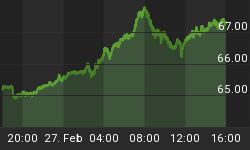Based on his recent public comments, Fed Chairman Bernanke seems determined to give the U.S. dollar the reputation of Egypt's Hosni Mubarak: an unwanted relic of the past that everyone agrees must go, but stubbornly clings to a privileged position.
The dollar is currently the world's ruling currency, but, as with Mubarak, I believe that growing public discontent will spur regime change quicker than most pundits expect.
Clearly, the most significant problem facing central bankers around the world is the recent eruption of inflation, which is sparking unrest in Asia and the Middle East. With respect to this issue, Bernanke is alternating hisresponses through two different personas.
Sometimes he chooses to act like Baghdad Bob, the Iraqi Information Minister who, in the opening days of the 2003 invasion of Iraq, continued to deny the presence of American troops even as U.S. tanks rumbled behind him. The parallel to Bernanke's testimony to Congress today is striking.
Speaking to the House Budget Committee, Baghdad Ben not only claimed that there is no evidence of overall inflation in the U.S., but that even food and energy prices are rising less than 1% annually. This is simply not true. He then claimed that the Fed's massive QE purchases of U.S. Treasuries do not distort the yield curve, despite the fact that he has stated repeatedly that the program was specifically designed to lower long-term rates.
The reason behind these lies should be evident. Acknowledging inflationary threats would force him to raise rates. But Baghdad Ben knows that the current economic "expansion" is a lie built on a weak foundation of ultra-low interest rates. He knows that even marginally higher rates will trigger a savage return to recession.
In his view, the only choice is to sell us an elaborate fiction - even when it obviously conflicts with the facts.
At other times, Chairman Bernanke assumes the persona of Marie Antoinette by professing regal indifference to how his own actions negatively impact thegreat unwashed.
In a rare Fed press conference last week, Bennie Antoinette showcased this "let them eat cake" attitude by declaring that U.S. monetary policy is solely designed to benefit the U.S., and that any adverse consequences in other countries are not his problem. As a result, he broadly absolved the Fed of any blame for global inflation, putting it instead on foreign governments for not allowingtheir currencies to appreciate and for keeping their interest rates too low.
It is this type of attitude from our top monetary policy maker - to either deny inflation or to lay blame elsewhere - that will accelerate the day of reckoning for the dollar.
Amazingly, for all its flaws, the buck remains the world's reserve currency. So, for now, the U.S. continues to enjoy all the rights and privileges that come from that status, including lower consumer prices and lower interest rates. But along with those benefits comes the great responsibility of not conducting monetary policy in a vacuum. Since the dollar is the benchmark currency, when it is debased, other currencies must follow suit. Because of the massive printing effort underway for some time now, the dollar has gone from an instrument of stability to an instrument of inflation.
A reserve currency must not go on in perpetual decline. Since abandoning the dollar as a reserve implies radical change with unknown consequences, governments have been very reluctant to take the chance. So, they are acting to preserve the status quo. But, in so doing, they're creating inflation in their own countries. Unfortunately, this strategy may prove more risky in the end.
Other factors are also influencing foreign central bankers to stick with the devil they know. For one, as emerging markets compete to export to the United States, no one wants to surrender what it perceives to be its competitive advantage. None of these governments yet understand that if the dollar were to collapse, new customers would be instantly created in those countries whose currencies appreciate against the dollar.
Emerging markets also feel obligated to protect the value of the trillions of dollars that they already hold in reserve. Like traders throwing good money after bad, their instinct is to average down their cost of their position. The reality is that the more dollars they buy, the more they will ultimately lose. Once they realize that the rise in their own currency will more than offset their dollar losses, they will cut their losses and run.
When emerging-market governments decide they do not want to eat Bennie's cake, but rather keep their own bread prices from rising, they will have to pursue the tighter monetary policies. When that happens, the dollar will lose its reserve status.
When the rest of the world no longer links their currencies to ours, the Fed will truly not have to worry about fueling global inflation. Instead, all of its inflation will burn through our banks accounts right here at home. And that blaze, so concentrated, will burn a lot hotter than the fires we see abroad.
Peter Schiff is CEO of Euro Pacific Capital and host of The Peter Schiff Show.
Subscribe to Euro Pacific's Weekly Digest: Receive all commentaries by Peter Schiff, Michael Pento, and John Browne deliveredto your inbox every Monday.
Click here for free access to Euro Pacific's new special report: What's Ahead for CanadianEnergy Trusts?
Be sure to pick up a copy of Peter Schiff's just-released economic fable, How an Economy Grows and Why It Crashes. Clickhere to learn more and order.















